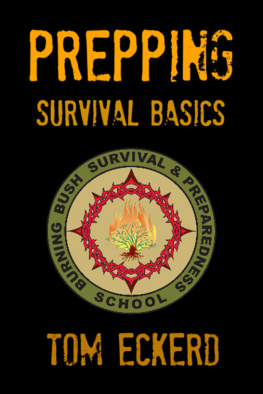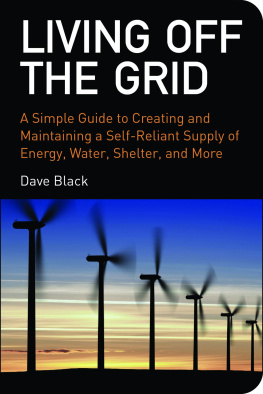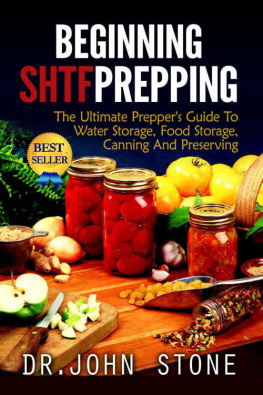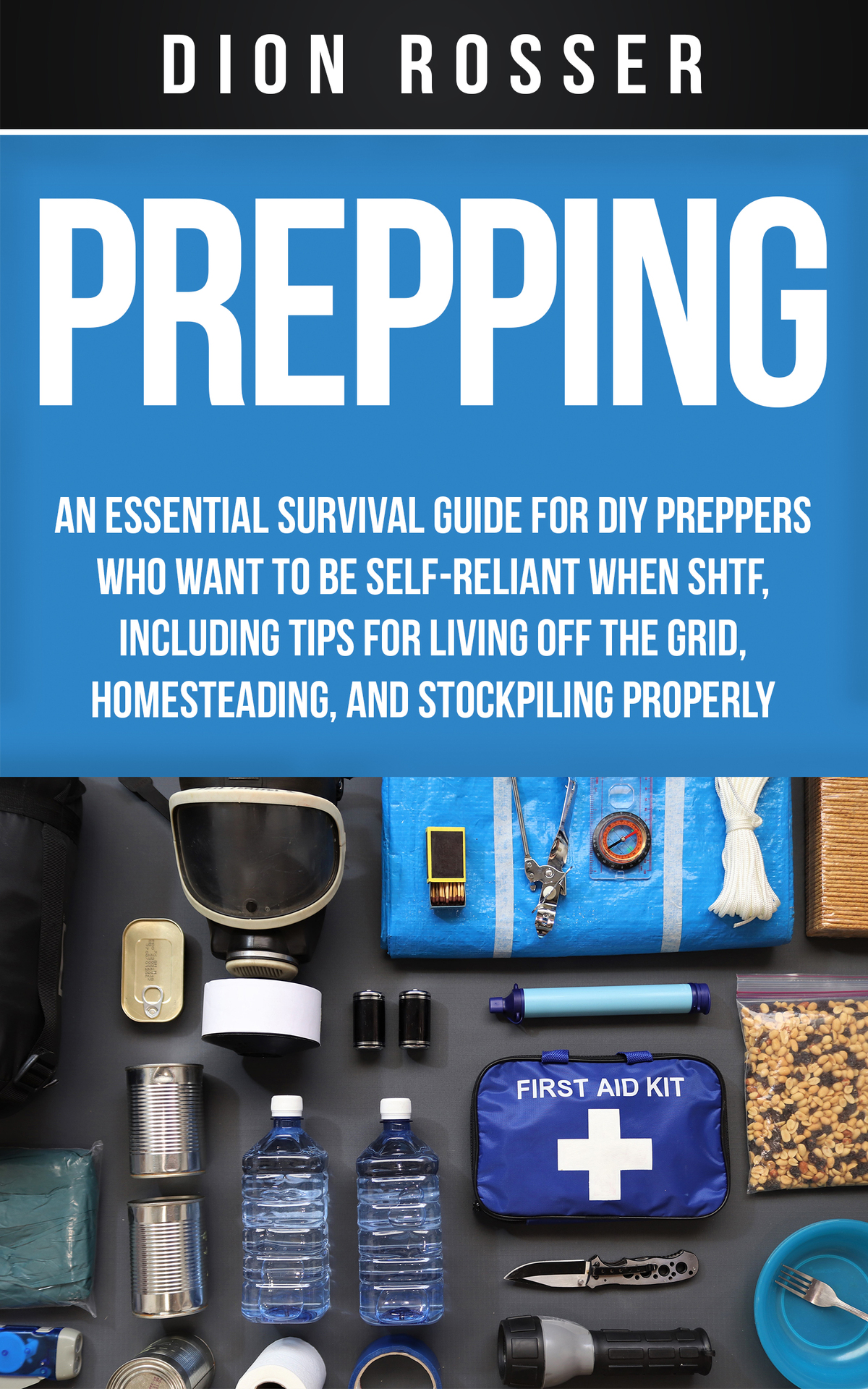Prepping
An Essential Survival Guide for DIY Preppers Who Want to Be Self-Reliant When SHTF,
Including Tips for Living Off the Grid, Homesteading, and Stockpiling Properly
Copyright 2020
All Rights Reserved. No part of this book may be reproduced in any form without permission in writing from the author. Reviewers may quote brief passages in reviews.
Disclaimer: No part of this publication may be reproduced or transmitted in any form or by any means, mechanical or electronic, including photocopying or recording, or by any information storage and retrieval system, or transmitted by email without permission in writing from the publisher.
While all attempts have been made to verify the information provided in this publication, neither the author nor the publisher assumes any responsibility for errors, omissions or contrary interpretations of the subject matter herein.
This book is for entertainment purposes only. The views expressed are those of the author alone, and should not be taken as expert instruction or commands. The reader is responsible for his or her own actions.
Adherence to all applicable laws and regulations, including international, federal, state and local laws governing professional licensing, business practices, advertising and all other aspects of doing business in the US, Canada, UK or any other jurisdiction is the sole responsibility of the purchaser or reader.
Neither the author nor the publisher assumes any responsibility or liability whatsoever on the behalf of the purchaser or reader of these materials. Any perceived slight of any individual or organization is purely unintentional.
Table of Contents
Introduction
Thank you for choosing Prepping: An Essential Survival Guide for DIY Preppers Who Want to Be Self-Reliant When SHTF, Including Tips for Living Off the Grid, Homesteading, and Stockpiling Properly as your preppers guide.
Obviously, you have an interest in learning how to be prepared, and congratulations on taking the right first step.
Prepping is all about being prepared for the worst-case scenario. To begin, look at the example of Super Storm Sandy. Sure, people knew it was coming; they had more than enough warning. They even knew what path it was headed for, and where it would strike first. Were they prepared? No way! Most people affected had lived through bad storms in the past, and that is what they based their prepping on. They didnt prepare for the absolute worst-case scenario , and that is what they got.
Most people didnt fully understand how the storm surge would affect them, how the flooding that followed would wreak havoc on their homes and lives. They followed the advice given to stockpile 72 hours worth of supplies , but it wasnt enough. What officials didnt take into account when they drew up their guidelines was the infrastructure how much it had aged and deteriorated.
And that is why you are here because you dont want to be caught out unprepared. That is what this guide is for to give you the most up-to-date information to make sure you can survive. And face it the way the world is going now, anything can happen. The weather is getting more extreme; wars are springing up everywhere, countries like Australia, states like California, even the Amazon, are burning, destroying precious resources and cutting people off, leaving them with no hope of rescue for some time. 72 hours worth of supplies wont do them any good, and it won't do you any good either.
This book has been written in a way that you will easily understand what to do. It includes step-by-step guides, hands-on tutorials, expert advice, and so much more. There is no fluff, no out-of-date information, and no hard to follow advice. Everything here is simple, sensible, and if you follow it properly, it is pretty easy to implement.
In no time at all, you will be a pro prepper, so dive in now and start this journey of discovery!
PART ONE: ESSENTIAL PREPPING
Understanding Prepping
At a fundamental level, prepping is a shortened version of the words preparation or preparing, but its modern use has taken it much further. Now, the word is associated with planning and prepping for disaster scenarios and major catastrophes. It involves basic things, such as stockpiling food, water, medicines, and so on yet it goes much deeper than that.
To some people, the very idea of stocking up for a large-scale disaster is nothing short of stupid, but the last few years should have taught people differently. The number of weather and war-related disasters is growing, becoming more commonplace than ever before, and it seems now that prepping is the obvious way to go. Who knows when the next disastrous flood will hit? The next out-of-control bushfires? Tornadoes and hurricanes? And, God forbid, who knows when and who will hit that red button?
Being unprepared is to be caught out big style; those who take the time to start prepping now will have a much better chance of survival than those who go through life thinking it will never happen.
Ask yourself this question do I have any kind of insurance? Health, life, home? If you do, that makes you a prepper. Insurance is your preparation for when something goes wrong, and the prepping being talked about here is the same thing. By building up your stockpiles and learning new skills, you are insuring yourself and your family against a future disaster that could lead to society collapsing.
Do you watch the news, read the papers, or listen to the radio? If you do, that means you are well aware of the rise in human-made and natural disasters. Just because they have not happened to you yet doesnt mean they wont, and there is no better way to be ready than to start prepping right now.
The Cold War with Russia was not that long ago, and people still live under the threat of nuclear war every day. Face it the United States of America doesnt exactly have the best relations with some countries, does it? What about terrorist attacks? Natural disasters? And what if another global pandemic, like the Spanish flu, struck? It could kill billions of people, and the impact on life would be horrendous, not to mention how the economy and society would be affected. How?
Electricity supplies could fail, stores would likely close, and food and water supplies could be heavily depleted. In short, the world as you know it now is in trouble, more than ever before, and everything you have come to take for granted could be gone in seconds. It could happen tomorrow, it could happen next year, in 200 years, or never, and that is the point of prepping nobody knows when the next disaster will hit; it is just that the preppers are ready for it.
6 Misconceptions about Preppers
These are six of the most common misconceptions about preppers:
Preppers are paranoid conspiracy theorists.
Television can take the blame for this. Many people think preppers are weirdos, paranoid ones at that. The truth is very different. Preppers are people who simply prefer not to rely on others for their survival should the SHTF. They are actually calm and balanced people who are ensuring they are prepared for anything.
Preppers are extremists who believe the apocalypse is about to hit.
Not at all. Prepping is nothing to do with zombies or government collapses. It is to do with being prepared for survival in any situation.
Preppers are isolated.
Sure, some may live out in the wilderness, but your next-door neighbor could be a prepper for all you know. It does not matter where you live; you can learn how to be self-sufficient, build fires, and purify water.





